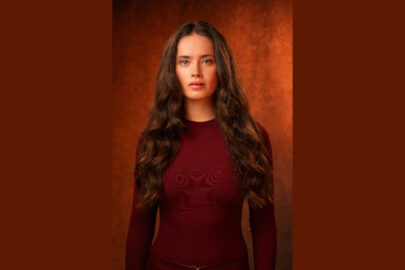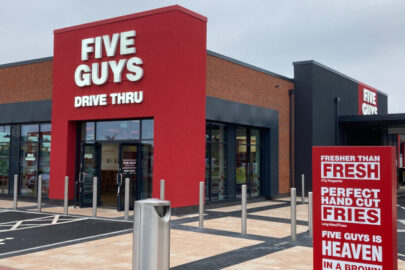Julia Sanina interview
Julia Sanina is a Ukrainian singer, composer and frontwoman of award-winning rock band The HARDKISS.
Alongside Alesha Dixon and Hannah Waddingham, she will host the Eurovision Song Contest Grand Final to a global TV audience of 160 million people.
Julia discusses the responsibility she feels as Ukraine’s sole on-stage presenter and how she hopes Eurovision will help refocus minds on her nation’s plight.
Words | Lawrence Saunders
Have you felt welcomed by the people of Liverpool since you arrived in the city?
I love Liverpool! It’s such a beautiful city with friendly people. I’ve seen so many Ukrainian flags and Ukrainian colours all over the city centre. I’ve also visited the beautiful Liverpool Cathedral and a place where Ukrainians and Liverpool citizens can pray for Ukraine. It was so heartwarming for me. I think Liverpool is a wonderful place to have Eurovision.
How important is it that Ukraine, and the situation in the country, is properly recognised and highlighted during Eurovision?
For me, it’s super important. I think that all Ukrainians feel support from the whole civilised world. Unfortunately, it’s still too unsafe in Kyiv for us to host Eurovision and we all understand that. We are so grateful that the UK is hosting on behalf of Ukraine and I see a mix and synergy of two different cultures. There will be a lot of Ukraine in this Eurovision – lots of Ukrainian performances and performers. I’ve seen a lot of Ukrainians working here backstage at Eurovision as well.
This attention on Ukraine is very important. It’s important that people are talking about Ukraine, that people are seeing Ukrainian culture, Ukrainian colours, the Ukrainian pysanky eggs on display in Liverpool ONE and even The Beatles statues at Pier Head wearing Ukrainian vyshyvanka (traditional embroidered shirts).
Everything means a lot to us. We are still fighting. The war is not over. We don’t know when we will have that victory and we need your support.
Do you feel any pressure as Ukraine’s sole presenter on stage at this year’s Eurovision?
Not pressure but certainly a sense of responsibility because I will be the only Ukrainian host on the stage. I know that Ukrainians will definitely watch Eurovision this year because they are all waiting to hear Ukrainian songs and to see something from Ukraine.
Of course, all [Ukrainians] are behind me and I feel that huge support. The whole nation is standing with me and I know that I am responsible for doing my job perfectly so I can make them proud. I’m preparing some wonderful outfits created by Ukrainian designers and lots of surprise moments!
Given the situation in Ukraine, will many people in the country be tuning in for Eurovision?
Eurovision in Ukraine is always huge. We love this show very much. We always see the Eurovision stage as a big international platform where we can display our culture and show that we are different from Russia. We are not part of Russia – we have our own culture and our own language.
Before this full invasion, many people only knew that Ukraine was a country near Russia and about Chernobyl and the Klitschko brothers. Unfortunately, the price has been too high, but now we can be seen and heard by the whole world.
This is why I think Ukrainians will definitely watch Eurovision this year. Ukraine is still under attack, especially the south of the country. The largest military attack seen since World War Two is going on right now in the centre of Europe but even in the bomb shelters we have the internet and I think people will need that couple of hours of joy and celebration of Ukrainian culture.
I think they will be proud of what we, together with the UK, will do on the stage.
Are you excited to be performing with your band The HARDKISS during the semi-final?
Yes, of course! We will sing our song ‘Маяк’, which means ‘lighthouse’ in English. This will be mixed with a very popular British song which I can’t name now because it’s a secret! But the main ideas behind both songs are the same. It’s about unification, support, sisterhood, brotherhood, and love, and the idea that hand in hand, we have to stay together.
The whole idea of Eurovision in the first place was unification after World War Two – the organisers wanted people to come together and support each other. This year’s Eurovision, like last year’s event, is about much more than just entertainment.
Are you hoping Liverpool hosting Eurovision on behalf of Ukraine will help put more focus on the plight of your country? Especially given the war has now been ongoing for more than a year.
Of course. A year is a huge period of time and unfortunately, people forget [what is happening in Ukraine]. It’s just how psychology works. We try to forget some things and put them back and away
[in our minds].
But we need to understand that Ukraine is fighting not only for its own territories, but for international law, justice and the European idea. We hope that people will not forget what we are going through right now and that they will stand with us in the future.















